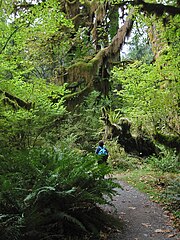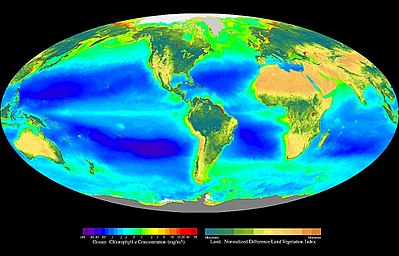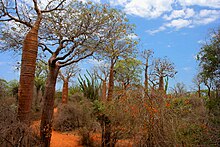There are many different ecosystems on Earth. Left: Coral reefs are a highly productive marine ecosystem[1], right: Temperate rainforest on the Olympic Peninsula in Washington state.
An ecosystem is a community made up of living organisms and nonliving components such as air, water, and mineral soil.[3] Ecosystems can be studied in two different ways. They can be thought of as interdependent collections of plants and animals, or as structured systems and communities governed by general rules.[4] The living (biotic) and non-living (abiotic) components interact through nutrient cycles and energy flows.[5] Ecosystems include interactions among organisms, and between organisms and their environment.[6] Ecosystems can be of any size but each ecosystem has a specific, limited space.[7] Some scientists view the entire planet as one ecosystem.
Energy, water, nitrogen and soil minerals are essential abiotic components of an ecosystem. The energy used by ecosystems comes primarily from the sun, via photosynthesis. Photosynthesis uses energy from the sun and also captures carbon dioxide from the atmosphere. Animals also play an important role in the movement of matter and energy through ecosystems. They influence the amount of plant and microbial biomass that lives in the system. As organic matter dies, carbon is released back into the atmosphere. This process also facilitates nutrient cycling by converting nutrients stored in dead biomass back to a form that can be used again by plants and other microbes.[9]
Ecosystems are controlled by both external and internal factors. External factors such as climate, the parent material that forms the soil, topography and time each affect ecosystems. However, these external factors are not themselves influenced by the ecosystem.[10] Ecosystems are dynamic: they are subject to periodic disturbances and are often in the process of recovering from past disturbances and seeking balance.[11] Internal factors are different: They not only control ecosystem processes but are also controlled by them. Another way of saying this is that internal factors are subject to feedback loops.[10]
Humans operate within ecosystems and can influence both internal and external factors.[10] Global warming is an example of a cumulative effect of human activities. Ecosystems provide benefits, called "ecosystem services", which people depend on for their livelihood. Ecosystem management is more efficient than trying to manage individual species.
Definition
There is no single definition of what constitutes an ecosystem.[4] German ecologist Ernst-Detlef Schulze and coauthors defined an ecosystem as an area which is "uniform regarding the biological turnover, and contains all the fluxes above and below the ground area under consideration." They explicitly reject Gene Likens' use of entire river catchments as "too wide a demarcation" to be a single ecosystem, given the level of heterogeneity within such an area.[12] Other authors have suggested that an ecosystem can encompass a much larger area, even the whole planet.[8] Schulze and coauthors also rejected the idea that a single rotting log could be studied as an ecosystem because the size of the flows between the log and its surroundings are too large, relative to the proportion cycles within the log.[12] Philosopher of science Mark Sagoff considers the failure to define "the kind of object it studies" to be an obstacle to the development of theory in ecosystem ecology.[4]Ecosystems can be studied in a variety of ways. Those include theoretical studies or more practical studies that monitor specific ecosystems over long periods of time or look at differences between ecosystems to better understand how they work. Some studies involve experimenting with direct manipulation of the ecosystem.[13] Studies can be carried out at a variety of scales, ranging from whole-ecosystem studies to to studying microcosms or mesocosms (simplified representations of ecosystems).[14] American ecologist Stephen R. Carpenter has argued that microcosm experiments can be "irrelevant and diversionary" if they are not carried out in conjunction with field studies done at the ecosystem scale. Microcosm experiments often fail to accurately predict ecosystem-level dynamics.[15]
The Hubbard Brook Ecosystem Study started in 1963 to study the White Mountains in New Hampshire. It was the first successful attempt to study an entire watershed as an ecosystem. The study used stream chemistry as a means of monitoring ecosystem properties, and developed a detailed biogeochemical model of the ecosystem.[16] Long-term research at the site led to the discovery of acid rain in North America in 1972. Researchers documented the depletion of soil cations (especially calcium) over the next several decades.[17]
Related concepts
Terrestrial ecosystems (found on land) and aquatic ecosystems (found in water) are concepts related to ecosystems. Aquatic ecosystems are split into marine ecosystems and freshwater ecosystems.Processes
Rainforest ecosystems are rich in biodiversity. This is the Gambia River in Senegal's Niokolo-Koba National Park.
Biomes of the world
External and internal factors
Ecosystems are controlled both by external and internal factors. External factors, also called state factors, control the overall structure of an ecosystem and the way things work within it, but are not themselves influenced by the ecosystem. The most important of these is climate.[10] Climate determines the biome in which the ecosystem is embedded. Rainfall patterns and seasonal temperatures influence photosynthesis and thereby determine the amount of water and energy available to the ecosystem.[10]Parent material determines the nature of the soil in an ecosystem, and influences the supply of mineral nutrients. Topography also controls ecosystem processes by affecting things like microclimate, soil development and the movement of water through a system. For example, ecosystems can be quite different if situated in a small depression on the landscape, versus one present on an adjacent steep hillside.[10]
Other external factors that play an important role in ecosystem functioning include time and potential biota. Similarly, the set of organisms that can potentially be present in an area can also significantly affect ecosystems. Ecosystems in similar environments that are located in different parts of the world can end up doing things very differently simply because they have different pools of species present.[10] The introduction of non-native species can cause substantial shifts in ecosystem function.
Unlike external factors, internal factors in ecosystems not only control ecosystem processes but are also controlled by them. Consequently, they are often subject to feedback loops.[10] While the resource inputs are generally controlled by external processes like climate and parent material, the availability of these resources within the ecosystem is controlled by internal factors like decomposition, root competition or shading.[10] Other factors like disturbance, succession or the types of species present are also internal factors.
Primary production
Global oceanic and terrestrial phototroph abundance, from September 1997 to August 2000. As an estimate of autotroph biomass, it is only a rough indicator of primary production potential and not an actual estimate of it.
Primary production is the production of organic matter from inorganic carbon sources. This mainly occurs through photosynthesis. The energy incorporated through this process supports life on earth, while the carbon makes up much of the organic matter in living and dead biomass, soil carbon and fossil fuels. It also drives the carbon cycle, which influences global climate via the greenhouse effect.
Through the process of photosynthesis, plants capture energy from light and use it to combine carbon dioxide and water to produce carbohydrates and oxygen. The photosynthesis carried out by all the plants in an ecosystem is called the gross primary production (GPP).[18] About 48–60% of the GPP is consumed in plant respiration.
The remainder, that portion of GPP that is not used up by respiration, is known as the net primary production (NPP).[19]
Energy flow
Energy and carbon enter ecosystems through photosynthesis, are incorporated into living tissue, transferred to other organisms that feed on the living and dead plant matter, and eventually released through respiration.[19]The carbon and energy incorporated into plant tissues (net primary production) is either consumed by animals while the plant is alive, or it remains uneaten when the plant tissue dies and becomes detritus. In terrestrial ecosystems, roughly 90% of the net primary production ends up being broken down by decomposers. The remainder is either consumed by animals while still alive and enters the plant-based trophic system, or it is consumed after it has died, and enters the detritus-based trophic system.
In aquatic systems, the proportion of plant biomass that gets consumed by herbivores is much higher.[20] In trophic systems photosynthetic organisms are the primary producers. The organisms that consume their tissues are called primary consumers or secondary producers—herbivores. Organisms which feed on microbes (bacteria and fungi) are termed microbivores. Animals that feed on primary consumers—carnivores—are secondary consumers. Each of these constitutes a trophic level.[20]
The sequence of consumption—from plant to herbivore, to carnivore—forms a food chain. Real systems are much more complex than this—organisms will generally feed on more than one form of food, and may feed at more than one trophic level. Carnivores may capture some prey which are part of a plant-based trophic system and others that are part of a detritus-based trophic system (a bird that feeds both on herbivorous grasshoppers and earthworms, which consume detritus). Real systems, with all these complexities, form food webs rather than food chains.[20]
Ecosystem ecology
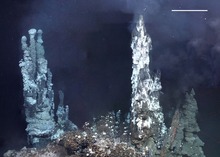
A hydrothermal vent is an ecosystem on the ocean floor. (The scale bar is 1 m.)
Ecosystem ecology studies "the flow of energy and materials through organisms and the physical environment". It seeks to understand the processes which govern the stocks of material and energy in ecosystems, and the flow of matter and energy through them. The study of ecosystems can cover 10 orders of magnitude, from the surface layers of rocks to the surface of the planet.[21]
Decomposition
The carbon and nutrients in dead organic matter are broken down by a group of processes known as decomposition. This releases nutrients that can then be re-used for plant and microbial production and returns carbon dioxide to the atmosphere (or water) where it can be used for photosynthesis. In the absence of decomposition, the dead organic matter would accumulate in an ecosystem, and nutrients and atmospheric carbon dioxide would be depleted.[22] Approximately 90% of terrestrial net primary production goes directly from plant to decomposer.[20]Decomposition processes can be separated into three categories—leaching, fragmentation and chemical alteration of dead material.
Leaching
As water moves through dead organic matter, it dissolves and carries with it the water-soluble components. These are then taken up by organisms in the soil, react with mineral soil, or are transported beyond the confines of the ecosystem (and are considered lost to it).[22] Newly shed leaves and newly dead animals have high concentrations of water-soluble components and include sugars, amino acids and mineral nutrients. Leaching is more important in wet environments and much less important in dry ones.[22]Fragmentation
Fragmentation processes break organic material into smaller pieces, exposing new surfaces for colonization by microbes. Freshly shed leaf litter may be inaccessible due to an outer layer of cuticle or bark, and cell contents are protected by a cell wall. Newly dead animals may be covered by an exoskeleton. Fragmentation processes, which break through these protective layers, accelerate the rate of microbial decomposition.[22] Animals fragment detritus as they hunt for food, as does passage through the gut. Freeze-thaw cycles and cycles of wetting and drying also fragment dead material.[22]Chemical alteration
The chemical alteration of the dead organic matter is primarily achieved through bacterial and fungal action. Fungal hyphae produce enzymes which can break through the tough outer structures surrounding dead plant material. They also produce enzymes which break down lignin, which allows them access to both cell contents and to the nitrogen in the lignin. Fungi can transfer carbon and nitrogen through their hyphal networks and thus, unlike bacteria, are not dependent solely on locally available resources.[22]Decomposition rates
Decomposition rates vary among ecosystems. The rate of decomposition is governed by three sets of factors—the physical environment (temperature, moisture, and soil properties), the quantity and quality of the dead material available to decomposers, and the nature of the microbial community itself.[23] Temperature controls the rate of microbial respiration; the higher the temperature, the faster microbial decomposition occurs. It also affects soil moisture, which slows microbial growth and reduces leaching. Freeze-thaw cycles also affect decomposition—freezing temperatures kill soil microorganisms, which allows leaching to play a more important role in moving nutrients around. This can be especially important as the soil thaws in the spring, creating a pulse of nutrients which become available.[23]Decomposition rates are low under very wet or very dry conditions. Decomposition rates are highest in wet, moist conditions with adequate levels of oxygen. Wet soils tend to become deficient in oxygen (this is especially true in wetlands), which slows microbial growth. In dry soils, decomposition slows as well, but bacteria continue to grow (albeit at a slower rate) even after soils become too dry to support plant growth.
Nutrient cycling

Biological nitrogen cycling
Ecosystems continually exchange energy and carbon with the wider environment. Mineral nutrients, on the other hand, are mostly cycled back and forth between plants, animals, microbes and the soil. Most nitrogen enters ecosystems through biological nitrogen fixation, is deposited through precipitation, dust, gases or is applied as fertilizer.[24]
Nitrogen cycle
Since most terrestrial ecosystems are nitrogen-limited, nitrogen cycling is an important control on ecosystem production.[24]Until modern times, nitrogen fixation was the major source of nitrogen for ecosystems. Nitrogen-fixing bacteria either live symbiotically with plants or live freely in the soil. The energetic cost is high for plants which support nitrogen-fixing symbionts—as much as 25% of gross primary production when measured in controlled conditions. Many members of the legume plant family support nitrogen-fixing symbionts. Some cyanobacteria are also capable of nitrogen fixation. These are phototrophs, which carry out photosynthesis. Like other nitrogen-fixing bacteria, they can either be free-living or have symbiotic relationships with plants.[24] Other sources of nitrogen include acid deposition produced through the combustion of fossil fuels, ammonia gas which evaporates from agricultural fields which have had fertilizers applied to them, and dust.[24] Anthropogenic nitrogen inputs account for about 80% of all nitrogen fluxes in ecosystems.[24]
When plant tissues are shed or are eaten, the nitrogen in those tissues becomes available to animals and microbes. Microbial decomposition releases nitrogen compounds from dead organic matter in the soil, where plants, fungi, and bacteria compete for it. Some soil bacteria use organic nitrogen-containing compounds as a source of carbon, and release ammonium ions into the soil. This process is known as nitrogen mineralization. Others convert ammonium to nitrite and nitrate ions, a process known as nitrification. Nitric oxide and nitrous oxide are also produced during nitrification.[24] Under nitrogen-rich and oxygen-poor conditions, nitrates and nitrites are converted to nitrogen gas, a process known as denitrification.[24]
Other nutrients
Other important nutrients include phosphorus, sulfur, calcium, potassium, magnesium and manganese.[25] Phosphorus enters ecosystems through weathering. As ecosystems age this supply diminishes, making phosphorus-limitation more common in older landscapes (especially in the tropics).[25] Calcium and sulfur are also produced by weathering, but acid deposition is an important source of sulfur in many ecosystems. Although magnesium and manganese are produced by weathering, exchanges between soil organic matter and living cells account for a significant portion of ecosystem fluxes. Potassium is primarily cycled between living cells and soil organic matter.[25]Function and biodiversity
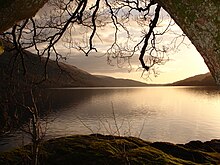
Loch Lomond in Scotland
forms a relatively isolated ecosystem. The fish community of this lake
has remained stable over a long period until a number of introductions in the 1970s restructured it's food web.[26]
Spiny forest at Ifaty, Madagascar, featuring various Adansonia (baobab) species, Alluaudia procera (Madagascar ocotillo) and other vegetation.
Biodiversity plays an important role in ecosystem functioning.[27] The reason for this is that ecosystem processes are driven by the number of species in an ecosystem, the exact nature of each individual species, and the relative abundance organisms within these species.[28] Ecosystem processes are broad generalizations that actually take place through the actions of individual organisms. The nature of the organisms—the species, functional groups and trophic levels to which they belong—dictates the sorts of actions these individuals are capable of carrying out and the relative efficiency with which they do so.
Ecological theory suggests that in order to coexist, species must have some level of limiting similarity—they must be different from one another in some fundamental way, otherwise one species would competitively exclude the other.[29] Despite this, the cumulative effect of additional species in an ecosystem is not linear—additional species may enhance nitrogen retention, for example, but beyond some level of species richness, additional species may have little additive effect.[28]
The addition (or loss) of species which are ecologically similar to those already present in an ecosystem tends to only have a small effect on ecosystem function. Ecologically distinct species, on the other hand, have a much larger effect. Similarly, dominant species have a large effect on ecosystem function, while rare species tend to have a small effect. Keystone species tend to have an effect on ecosystem function that is disproportionate to their abundance in an ecosystem.[28] Similarly, an ecosystem engineer is any organism that creates, significantly modifies, maintains or destroys a habitat.
Dynamics
Ecosystems are dynamic entities. They are subject to periodic disturbances and are in the process of recovering from some past disturbance.[11] When a perturbation occurs, an ecoystem responds by moving away from its initial state. The tendency of an ecosystem to remain close to its equilibrium state, despite that disturbance, is termed its resistance. On the other hand, the speed with which it returns to its initial state after disturbance is called its resilience.[11] Time plays a role in the development of soil from bare rock and the recovery of a community from disturbance.[10]From one year to another, ecosystems experience variation in their biotic and abiotic environments. A drought, an especially cold winter and a pest outbreak all constitute short-term variability in environmental conditions. Animal populations vary from year to year, building up during resource-rich periods and crashing as they overshoot their food supply. These changes play out in changes in net primary production decomposition rates, and other ecosystem processes.[11] Longer-term changes also shape ecosystem processes—the forests of eastern North America still show legacies of cultivation which ceased 200 years ago, while methane production in eastern Siberian lakes is controlled by organic matter which accumulated during the Pleistocene.[11]
Disturbance also plays an important role in ecological processes. F. Stuart Chapin and coauthors define disturbance as "a relatively discrete event in time and space that alters the structure of populations, communities, and ecosystems and causes changes in resources availability or the physical environment".[30] This can range from tree falls and insect outbreaks to hurricanes and wildfires to volcanic eruptions. Such disturbances can cause large changes in plant, animal and microbe populations, as well soil organic matter content.[11] Disturbance is followed by succession, a "directional change in ecosystem structure and functioning resulting from biotically driven changes in resources supply."[30]
The frequency and severity of disturbance determine the way it affects ecosystem function. A major disturbance like a volcanic eruption or glacial advance and retreat leave behind soils that lack plants, animals or organic matter. Ecosystems that experience such disturbances undergo primary succession. A less severe disturbance like forest fires, hurricanes or cultivation result in secondary succession and a faster recovery.[11] More severe disturbance and more frequent disturbance result in longer recovery times.
Classification methods
Classifying ecosystems into ecologically homogeneous units is an important step towards effective ecosystem management.[31] There is no single, agreed-upon way to do this. A variety of systems exist, based on vegetation cover, remote sensing, and bioclimatic classification systems.[31]Ecological land classification is a cartographical delineation or regionalisation of distinct ecological areas, identified by their geology, topography, soils, vegetation, climate conditions, living species, habitats, water resources, and sometimes also anthropic factors.[32]
Human activities
Human activities are important in almost all ecosystems. Although humans exist and operate within ecosystems, their cumulative effects are large enough to influence external factors like climate.[10]Ecosystem goods and services
The High Peaks Wilderness Area in the 6,000,000-acre (2,400,000 ha) Adirondack Park is an example of a diverse ecosystem.
Ecosystems provide a variety of goods and services upon which people depend.[33] Ecosystem goods include the "tangible, material products" of ecosystem processes such as food, construction material, medicinal plants.[34] They also include less tangible items like tourism and recreation, and genes from wild plants and animals that can be used to improve domestic species.[33]
Ecosystem services, on the other hand, are generally "improvements in the condition or location of things of value".[34] These include things like the maintenance of hydrological cycles, cleaning air and water, the maintenance of oxygen in the atmosphere, crop pollination and even things like beauty, inspiration and opportunities for research.[33] While ecosystem goods have traditionally been recognized as being the basis for things of economic value, ecosystem services tend to be taken for granted.[34]
Ecosystem management
When natural resource management is applied to whole ecosystems, rather than single species, it is termed ecosystem management.[35] Although definitions of ecosystem management abound, there is a common set of principles which underlie these definitions.[36] A fundamental principle is the long-term sustainability of the production of goods and services by the ecosystem;[36] "intergenerational sustainability [is] a precondition for management, not an afterthought".[33]While ecosystem management can be used as part of a plan for wilderness conservation, it can also be used in intensively managed ecosystems[33] (see, for example, agroecosystem and close to nature forestry).
Threats caused by humans
As human populations and per capita consumption grow, so do the resource demands imposed on ecosystems and the effects of the human ecological footprint. Natural resources are vulnerable and limited. The environmental impacts of anthropogenic actions are becoming more apparent. Problems for all ecosystems include: environmental pollution, climate change and biodiversity loss. For terrestrial ecosystems further threats include air pollution, soil degradation, and deforestation. For aquatic ecosystems threats include also unsustainable exploitation of marine resources (for example overfishing of certain species), marine pollution, microplastics pollution, water pollution, and building on coastal areas.[37]Society is increasingly becoming aware that ecosystem services are not only limited but also that they are threatened by human activities. The need to better consider long-term ecosystem health and its role in enabling human habitation and economic activity is urgent. To help inform decision-makers, many ecosystem services are being assigned economic values, often based on the cost of replacement with anthropogenic alternatives. The ongoing challenge of prescribing economic value to nature, for example through biodiversity banking, is prompting transdisciplinary shifts in how we recognize and manage the environment, social responsibility, business opportunities, and our future as a species.
History
The term "ecosystem" was first used in 1935 in a publication by British ecologist Arthur Tansley.[fn 1][38] Tansley devised the concept to draw attention to the importance of transfers of materials between organisms and their environment.[39] He later refined the term, describing it as "The whole system, ... including not only the organism-complex, but also the whole complex of physical factors forming what we call the environment".[40] Tansley regarded ecosystems not simply as natural units, but as "mental isolates".[40] Tansley later defined the spatial extent of ecosystems using the term ecotope.[41]G. Evelyn Hutchinson, a limnologist who was a contemporary of Tansley's, combined Charles Elton's ideas about trophic ecology with those of Russian geochemist Vladimir Vernadsky. As a result, he suggested that mineral nutrient availability in a lake limited algal production. This would, in turn, limit the abundance of animals that feed on algae. Raymond Lindeman took these ideas further to suggest that the flow of energy through a lake was the primary driver of the ecosystem. Hutchinson's students, brothers Howard T. Odum and Eugene P. Odum, further developed a "systems approach" to the study of ecosystems. This allowed them to study the flow of energy and material through ecological systems.
![Coral reefs are a highly productive marine ecosystem.[2]](https://upload.wikimedia.org/wikipedia/commons/thumb/7/76/Blue_Linckia_Starfish.JPG/180px-Blue_Linckia_Starfish.JPG)
